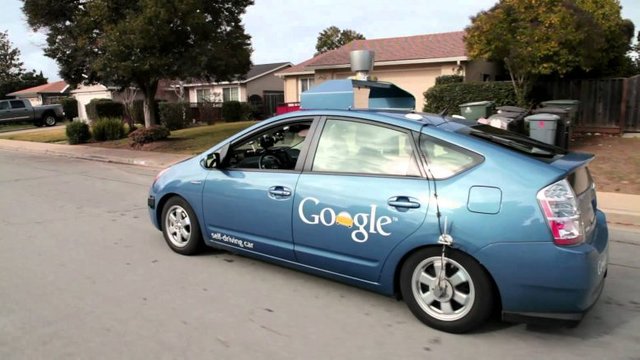
Will the ongoing transition to self-driving cars come at the cost of passenger privacy?
On September 6 the U.S. House of Representatives unanimously passed a bill which spurs on further development of autonomous vehicles, but civil liberties advocates fear the further erosion of privacy. The so-called “SELF DRIVE Act” has been hailed as an opportunity to improve traffic safety and reduce vehicle deaths. If the bill passes the Senate and becomes law it would prevent states from passing certain laws to regulate the technology. The Hill reports the bill would also “allow car manufacturers to deploy up to 100,000 self-driving cars a year that don’t meet normal safety standards. In the first year, however, that number will be capped at 25,000.”
States would still handle vehicle registration, insurance, driver education, law enforcement and other local issues. Self-driving vehicle manufacturers will be required to include privacy protections in their vehicles.
With the advent of autonomous vehicles we must seriously think about the implications of bringing the interconnected Internet of Things into our lives on the road. The vehicles sensors will constantly be sucking up data and feeding it into the navigation system. The wide variety of data (weather, traffic, speed, location, time, date) could potentially reveal private details to the manufacturer, law enforcement, or hacker. As Observer notes, by tracking this data one might be able to view “lots of trips taking place between two competing companies” which “could suggest a merger deal underway”. There is also the fear of tracking an individuals daily habits by monitoring the data coming from the self-driving vehicle.
“Security researchers were able to easily identify individual taxi cabs in a pool of data about trips and fares collected by the New York Taxi and Limousine Commission,” the Observer wrote. “Then, by using images captured by photographers and social media, they could identify specific trips taken by celebrities (and how much they tipped).”
In a recent article published by the World Economic Forum, David Lindsay, a board member of the Australian Privacy Foundation, wrote about the distinguishing features of the types of autonomous vehicles and the dangers associated. “There is no single, uniform design for autonomous vehicles,” Lindsay wrote. “Rather, it is best to understand an autonomous vehicle as a particular configuration of a combination of applications, some of which – such as adaptive cruise control, lane departure warnings, collision avoidance and parking assistance – are already part of current car design.”
Lindsay goes on to describe Google’s self-driving car, as well as prototypes being developed by Mercedes-Benz, Volkswagen, Toyota and Oxford University. He imagines a scenario where personalized ads might be displayed in the car, or a vehicle’s route adjusts in order to pass by businesses which match a user’s search history or preferences.
“One consequence of the range of sensors and data collection devices being deployed (and interconnected) is that our offline activities can leave traces at least as extensive as those generated online,” Lindsay wrote. “For instance, autonomous vehicles often incorporate event recorders, or “black boxes,” to provide essential information in the event of an accident. This raises questions about who has rights to this data and about who can have access to the data.”
Not only is privacy at risk, but the age of the autonomous car will likely herald a new age of corporate advertising. Much like the Internet and cell phones have allowed for custom advertisements based on browsing history, self-driving cars will likely come with ads based on your driving habits and your Internet search history. The Atlantic recently did a great job illustrating how these vehicles can (and likely will) adjust their behavior and make suggestions based on “sponsored destinations.”
There we were. The car picked us up. We wanted coffee. It suggested Peet’s. But if we’d stopped to look at the map on the screen when this happened, we might have noticed that Peet’s wasn’t actually the most efficient place to stop, nor was it on your list of preferred coffee shops, which the car’s machine-learning algorithm developed over time. Peet’s was, instead, a sponsored destination—not unlike a sponsored search result on Google.
As far as searching your browsing history…
As for the lunch special, that really is a favorite restaurant of yours—but the car has never driven you there before. It knows your preferences because the vehicle has combed through your emails, identified key words, and assessed related messages for emotional tone.
These autonomous vehicles will eventually make decisions for you, rather than the other way around. This may sound intriguing – like a sci-fi movie come to life – but we must be willing to ask ourselves how much of our lives are we willing to relinquish in the name of convenience and security? As David Lindsay notes, “the more people are habituated to decisions being made for them, the less likely they may be to make their own decisions.” At what point do we say “no more!” and choose to take more control of our lives, rather than less?
This article may be freely reposted in part or in full with author attribution and source link.
I am an investigative journalist and liberty activist; a Lead Investigative Reporter for ActivistPost.com and the founder of the TheConsciousResistance.com & The Houston Free Thinkers. I have also co-authored three books with @johnvibes: The Conscious Resistance: Reflections on Anarchy and Spirituality and Finding Freedom in an Age of Confusion, Vol. 1 and Finding Freedom in an Age of Confusion, Vol. 2
Donate via:
- Bitcoin: 16fDdrZvt9XUv7TyboSYtaHfcxMb22Yiew
- Ethereum: 0x8d20b442de44C28467b3d66939ff3077F9CfCb24
- DASH: XbPpwz1ZvtkTeik1y3wDgrHRJTEst564XH
I am always available for interviews, Please contact [email protected]
I greatly appreciate any support here or on my other social media:

Sounds like good opportunity to integrate some new crypto-solution for data collection without affecting privacy :)
Downvoting a post can decrease pending rewards and make it less visible. Common reasons:
Submit
How far can we trust the technology ? i'm not sure if i would be using automated ones on roads
Downvoting a post can decrease pending rewards and make it less visible. Common reasons:
Submit
Eventually decentralization tech will cause an equity drain on centralized technologies. Authority structures will become obsolete. When a car is taking commands or directions for a destination from a blockchain that has no central authority, who do you sue for insurance purposes? It will also be pointless to register a vehicle for the same reason. The authority might not even exist any more.
Downvoting a post can decrease pending rewards and make it less visible. Common reasons:
Submit
I predict in less than 15 years it won't make sense to even buy a car (unless you live in a very remote area). You'll just open up your Uber app, order a ride, and an automated vehicle will pick you up in a snap. Everyone owning vehicles is an enormous waste, imagine how many rides your car could provide while you're just sitting at work for 9 hours.
Downvoting a post can decrease pending rewards and make it less visible. Common reasons:
Submit
One consideration is that we might see a reduced interest in vehicle ownership in the future with ride sharing applications. I'm not getting rid of my 2003 Honda just yet. This one is going to 300,000 miles.
Downvoting a post can decrease pending rewards and make it less visible. Common reasons:
Submit
"Stopping technology innovation is stopping the future"
Downvoting a post can decrease pending rewards and make it less visible. Common reasons:
Submit
This is not for me. A car that'll "self drive" you straight to jail when the powers the shouldn't be don't like you. I'll pass, thank you very much.
Downvoting a post can decrease pending rewards and make it less visible. Common reasons:
Submit
yes, i think privacy is going to be a very big problem for people in the future, every time i see a new device connected to the internet with an application, i think how much can i trust this device, i hope the coming years brings a solution for such problems
Downvoting a post can decrease pending rewards and make it less visible. Common reasons:
Submit
So in September they passed that bill but they haven’t moved on this one. https://steemit.com/news/@choosefreedom/what-happened-to-the-marijuana-justice-act-of-2017
Downvoting a post can decrease pending rewards and make it less visible. Common reasons:
Submit
I will resist any and all forms of AI until I just can't anymore. The driverless car is a terrifying notion wrapped and bundled in a nice pretty package to sell to the masses who have yet to take the red pill. Great article Derrick.
Downvoting a post can decrease pending rewards and make it less visible. Common reasons:
Submit
Good...
Downvoting a post can decrease pending rewards and make it less visible. Common reasons:
Submit